- Home
- W. Somerset Maugham
Ah King
Ah King Read online
W. SOMERSET MAUGHAM
is the world-famous author of such outstanding novels as
OF HUMAN BONDAGE.
CAKES AND ALE.
THE RAZOR'S EDGE.
THE MOON AND SIXPENCE,
and many others.
AH KING Is a collection of Maugham's most exciting stories about life in the savage tropics of the Far East.
". . . able, professional story-telling, excellent by way of intelligent diversion
. . . the characters are analyzed with penetrating cleverness."
—New York Times
". . . six times he has imagined what might have happened in such a district, and six times he has concocted a plot of his own making, shaken it up with persons and places that are real and six times he has really brought it off."
—Saturday Review
AH KING
W. Somerset Maugham
BERKLEY PUBLISHING CORP.
145 West 57th Street • New York 19, N. Y.
COPYRIGHT © 1926, 1931, 1932, 1933,
BY W. SOMERSET MAUGHAM
Published by arrangement with
Doubleday & Company, Inc.
BERKLEY EDITION, AUGUST, 1958
PRINTED IN THE UNITED STATES OF AMERICA
CONTENTS
AH KING . . . 5
THE SIX STORIES
FOOTPRINTS IN THE JUNGLE . . . 8
THE DOOR OF OPPORTUNITY . . . 39
THE VESSEL OF WRATH . . . 72
THE BOOK-BAG . . . 109
THE BACK OF BEYOND . . . 145
NEIL MACADAM . . . 177
AH KING
I WAS in Singapore, about to start on a journey through Borneo, Indo-China and Siam, and I wanted a servant who could turn his hand to anything. I asked my friends if they knew a Chinese who was looking for a job, and they all knew the very man who would have suited me, but unfortunately he had just taken a place or had gone back to Canton for a holiday. Then someone gave me the address of a registry office. I went there, finding it with some difficulty; it was a trim little bungalow, standing in its own small garden, and somehow or other it gave me a sinister impression. I was received by a Eurasian, with flashing eyes, a flat muddy face and glittering teeth. He was ingratiating; he smiled a great deal and knew, almost before I began to speak, so exactly what I wanted that I despaired of explaining myself. He told me that he would have no difficulty at all in finding me what I wanted and impressively opened a huge ledger in which were the names of the servants on his list He was very much annoyed when he discovered that every likely man had either just got a place or had gone for a holiday to Canton. At last he besought me, with tears in his eyes, to come back in three or four days, or a week, or maybe a month and he was quite sure that he would have the perfect servant for me. I explained that I was leaving Singapore next day and must have a boy to take with me. He vowed it was impossible and in his distress wrung his hands, and then said that if I would wait half an hour he would see what he could do. I lit a cigarette and prepared to wait He left me.
He returned in an hour bringing with him a youth of twenty, with a smooth yellow face, a shy look in his black eyes, smallish, but very neat in his white clothes and self-possessed. His name was Ah King and he was prepared to travel. He spoke English. He showed me his references, written on grubby half-sheets of paper, and they were very satisfactory. He was said to be clean and willing, industrious and well up in his duties. 1 liked his look and at once engaged him.
Next day we set out I soon found that though he could speak English tolerably he could not understand it, so that our conversation was one-sided. He was with me for six months. He was a perfect servant. He could cook, he could valet, he could pack, he could wait at table. He was quick, neat and silent. He was imperturbable. Nothing surprised him, no catastrophe dismayed him, no hardship ruffled him, no novelty took him unawares. It was impossible to tire him. He smiled all day long. I have never met anyone so good-humoured. He had his idiosyncrasies. He was very fond of having a bath and at first when I discovered that the moment my back was turned he went into my bathroom and washed himself with my soap and dried himself with my towel I felt a little uncomfortable. But I told myself that I must not be pernickety. His only fault was that when I was just starting to catch a train or get on to a boat he was nowhere to be found. I would send people hunting for him. He bad vanished. No one knew where he was. In the end I had to set off without him, but always, just as the train was steaming out or the last tender about to leave the quay, he would stroll along, unhurried and smiling; and when, fuming with rage, I asked him what the devil he meant by going off like that he continued to smile.
“I no miss train,” he said. “Plenty time. Train always wait”
And when I asked him where he had been he looked at me with his calm, untroubled eyes and answered:
“Nowhere. I go for a walk.”
My journey came to an end and I returned to Singapore, intending from there to sail for Europe. I told Ah King that I should not want him any more. He asked me for a testimonial. I gave him this and his wages and a present.
“Good-bye, Ah King,” I said. “I hope you’ll find another job soon.”
Then I saw that he was crying. I stared at him with amazement. An excellent servant, he had attended to all my wants for six months, but he had always seemed to me strangely detached; he had been as indifferent to my praise as he was unconcerned at my reproofs. It had never occurred to me for an instant that he looked upon me as anything but an odd, rather silly person who paid his wages and gave him board and lodging. That he had any feeling for me had never entered my head. I was embarrassed. I felt a little uncomfortable. I knew that I had often been impatient with him, tiresome and exacting. I had never thought of him as a human being. He wept because he was leaving me. It is for these tears that I now give his name to this collection of stories that I invented while he was travelling with me. To the best of my belief the characters that play their part in them are creatures of my own fancy.
FOOTPRINTS IN THE JUNGLE
THERE is no place in Malaya that has more charm than Tanah Merah. It lies on the sea, and the sandy shore is fringed with casuarinas. The government offices are still in the old Raad Huis that the Dutch built when they owned the land, and on the hill stand the grey ruins of the fort by aid of which the Portuguese maintained their hold over the unruly natives. Tanah Merah has a history and in the vast labyrinthine houses of the Chinese merchants, backing on the sea so that in the cool of the evening they may sit in their loggias and enjoy the salt breeze, families dwell that have been settled in the country for three centuries. Many have forgotten their native language and hold intercourse with one another in Malay and pidgin English. The imagination lingers here gratefully, for in the Federated Malay States the only past is within the memory for the most part of the fathers of living men.
Tanah Merah was for long the busiest mart of the Middle East and its harbour was crowded with shipping when the clipper and the junk still sailed the China seas. But now it is dead. It has the sad and romantic air of all places that have once been of importance and live now on the recollection of a vanished grandeur. It is a sleepy little town and strangers that come to it, losing their native energy, insensibly drop into its easy and lethargic ways. Successive rubber booms bring it no prosperity and the ensuing slumps hasten its decay.
The European quarter is very silent. It is trim and neat and clean. The houses of the white men-government servants and agents of companies-stand round an immense padang, agreeable and roomy bungalows shaded by great cassias, and the padang is vast and green and well cared for, like the lawn of a cathedral close, and indeed there is in the aspect of this corner of Tanah Merah something quiet and delicately secluded that reminds you of the pre
cincts of Canterbury.
The club faces the sea; it is a spacious but shabby building; it has an air of neglect and when you enter you feel that you intrude. It gives you the impression that it is closed really, for alterations and repairs, and that you have taken indiscreet advantage of an open door to go where you are not wanted. In the morning you may find there a couple of planters who have come in from their estates on business and are drinking a gin-sling before starting back again; and latish in the afternoon a lady or two may perhaps be seen looking with a furtive air through old numbers of the Illustrated London News. At nightfall a few men saunter in and sit about the billiard-room watching the play and drinking sukas. But on Wednesdays there is a little more animation. On that day the gramophone is set going in the large room upstairs and people come in from the surrounding country to dance. There are sometimes no less than a dozen couples and it is even possible to make up two tables of bridge.
It was on one of these occasions that I met the Cartwrights. I was staying with a man called Gaze who was head of the police and he came into the billiard-room, where I was sitting, and asked me if I would make up a four. The Cartwrights were planters and they came in to Tanah Merah on Wednesdays because it gave their girl a chance of a little fun. They were very nice people, said Gaze, quiet and unobtrusive, and played a very pleasant game of bridge. I followed Gaze into the card-room and was introduced to them. They were already seated at a table and Mrs Cartwright was shuffling the cards. It inspired me with confidence to see the competent way in which she did it. She took half the pack in each hand, and her hands were large and strong, deftly inserted the corners of one half under the corners of the other, and with a click and a neat bold gesture cascaded the cards together.
It had all the effect of a conjuring trick. The card-player knows that it can be done perfectly only after incessant practice. He can be fairly sure that anyone who can so shuffle a pack of cards loves cards for their own sake.
“Do you mind if my husband and I play together?” asked Mrs Cartwright. “It’s no fun for us to win one another’s money.”
“Of course not.”
We cut for deal and Gaze and I sat down.
Mrs Cartwright drew an ace and while she dealt, quickly and neatly, chatted with Gaze of local affairs. But I was aware that she took stock of me. She looked shrewd, but good-natured.
She was a woman somewhere in the fifties (though in the East, where people age quickly, it is difficult to tell their ages), with white hair very untidily arranged, and a constant gesture with her was an impatient movement of the hand to push back a long wisp of hair that kept falling over her forehead. You wondered why she did not, by the use of a hairpin or two, save herself so much trouble. Her blue eyes were large, but pale and a little tired; her face was lined and sallow; I think it was her mouth that gave it the expression which I felt was characteristic of caustic but tolerant irony. You saw that here was a woman who knew her mind and was never afraid to speak it. She was a chatty player (which some people object to strongly, but which does not disconcert me, for I do not see why you should behave at the card-table as though you were at a memorial service) and it was soon apparent that she had an effective knack of badinage. It was pleasantly acid, but it was amusing enough to be offensive only to a fool. If now and then she uttered a remark so sarcastic that you wanted all your sense of humour to see the fun in it, you could not but quickly see that she was willing to take as much as she gave. Her large, thin mouth broke into a dry smile and her eyes shone brightly when by a lucky chance you brought off a repartee that turned the laugh against her.
I thought her a very agreeable person. I liked her frankness. I liked her quick wit. I liked her plain face. I never met a woman who obviously cared so little how she looked. It was not only her head that was untidy, everything about her was slovenly; she wore a high-necked silk blouse, but for coolness had unbuttoned the top buttons and showed a gaunt and withered neck; the blouse was crumpled and none too clean, for she smoked innumerable cigarettes and covered herself with ash. When she got up for a moment to speak to somebody I saw that her blue skirt was rather ragged at the hem and badly needed a brush, and she wore heavy, low-heeled boots. But none of this mattered. Everything she wore was perfectly in character.
And it was a pleasure to play bridge with her. She played very quickly, without hesitation, and she had not only knowledge but flair. Of course she knew Gaze’s game, but I was a stranger and she soon took my measure. The team-work between her husband and herself was admirable; he was sound and cautious, but knowing him, she was able to be bold with assurance and brilliant with safety. Gaze was a player who founded a foolish optimism on the hope that his opponents would not have the sense to take advantage of his errors, and the pair of us were no match for the Cartwrights. We lost one rubber after another, and there was nothing to do but smile and look as if we liked it.
“I don’t know what’s the matter with the cards,” said Gaze at last, plaintively. “Even when we have every card in the pack we go down.”
“It can’t be anything to do with your play,” answered Mrs Cartwright, looking him full in the face with those pale blue eyes of hers, “it must be bad luck pure and simple. Now if you hadn’t had your hearts mixed up with your diamonds in that last hand you’d have saved the game.”
Gaze began to explain at length how the misfortune, which had cost us dear, occurred, but Mrs Cartwright, with a deft flick of the hand, spread out the cards in a great circle so that we should cut for deal. Cartwright looked at the time.
“This will have to be the last, my dear,” he said.
“Oh, will it?” She glanced at her watch and then called to a young man who was passing through the room. “Oh, Mr Bullen, if you’re going upstairs tell Olive that we shall be going in a few minutes.” She turned to me. “It takes us the best part of an hour to get back to the estate and poor Theo has to be up at the crack of dawn.”
“Oh, well, we only come in once a week,” said Cartwright, “and it’s the one chance Olive gets of being gay and abandoned.”
I thought Cartwright looked tired and old. He was a man of middle height, with a bald, shiny head, a stubbly grey moustache, and gold-rimmed spectacles. He wore white ducks and a black-and-white tie. He was rather neat and you could see he took much more pains with his clothes than his untidy wife. He talked little, but it was plain that he enjoyed his wife’s caustic humour and sometimes he made quite a neat retort. They were evidently very good friends. It was pleasing to see so solid and tolerant an affection between two people who were almost elderly and must have lived together for so many years.
It took but two hands to finish the rubber and we had just ordered a final gin and bitters when Olive came down.
“Do you really want to go already, Mumsey?” she asked.
Mrs Cartwright looked at her daughter with fond eyes.
“Yes, darling. It’s nearly half past eight. It’ll be ten before we get our dinner.”
“Damn our dinner,” said Olive gaily.
“Let her have one more dance before we go,” suggested Cartwright.
“Not one. You must have a good night’s rest.”
Cartwright looked at Olive with a smile.
“If your mother has made up her mind, my dear, we may just as well give in without any fuss.”
“She’s a determined woman,” said Olive, lovingly stroking her mother’s wrinkled cheek.
Mrs Cartwright patted her daughter’s hand, and kissed it.
Olive was not very pretty, but she looked extremely nice. She was nineteen or twenty, I suppose, and she had still the plumpness of her age; she would be more attractive when she had fined down a little. She had none of the determination that gave her mother’s face so much character, but resembled her father; she had his dark eyes and slightly aquiline nose, and his look of rather weak good nature. It was plain that she was strong and healthy. Her cheeks were red and her eyes bright. She had a vitality that he had long since lost. Sh
e seemed to be the perfectly normal English girl, with high spirits, a great desire to enjoy herself, and an excellent temper.
When we separated. Gaze and I set out to walk to his house.
“What did you think of the Cartwrights?” he asked me.
“I liked them. They must be a great asset in a place like this.”
“I wish they came oftener. They live a very quiet life.”
“It must be dull for the girl. The father and mother seem very well satisfied with one another’s company.”
“Yes, it’s been a great success.”
“Olive is the image of her father, isn’t she?”
Gaze gave me a sidelong glance.
“Cartwright isn’t her father. Mrs Cartwright was a widow when he married her. Olive was born four months after her father’s death.”
“Oh!”
I drew out the sound in order to put in it all I could of surprise, interest, and curiosity. But Gaze said nothing and we walked the rest of the way in silence. The boy was waiting at the door as we entered the house and after a last gin pahit we sat down to dinner.
At first Gaze was inclined to be talkative. Owing to the restriction of the output of rubber there had sprung up a considerable activity among the smugglers and it was part of his duty to circumvent their knavishness. Two junks had been captured that day and he was rubbing his hands over his success. The go-downs were full of confiscated rubber and in a little while it was going to be solemnly burnt. But presently he fell into silence and we finished without a word. The boys brought in coffee and brandy and we lit our cheroots. Gaze leaned back in his chair. He looked at me reflectively and then looked at his brandy. The boys had left the room and we were alone.
“I’ve known Mrs Cartwright for over twenty years,” he said slowly. “She wasn’t a bad-looking woman in those days. Always untidy, but when she was young it didn’t seem to matter so much. It was rather attractive. She was married to a man called Bronson. Reggie Bronson. He was a planter. He was manager of an estate up in Selantan and I was stationed at Alor Lipis. It was a much smaller place than it is now; I don’t suppose there were more than twenty people in the whole community, but they had a jolly little club, and we used to have a very good time. I remember the first time I met Mrs Bronson as though it was yesterday. There were no cars in those days and she and Bronson had ridden in on their bicycles. Of course then she didn’t look so determined as she looks now. She was much thinner, she had a nice colour, and her eyes were very pretty-blue, you know-and she had a lot of dark hair. If she’d only taken more trouble with herself she’d have been rather stunning. As it was she was the best-looking woman there.”

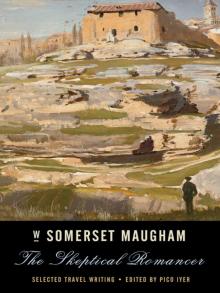 The Skeptical Romancer: Selected Travel Writing
The Skeptical Romancer: Selected Travel Writing The Summing Up
The Summing Up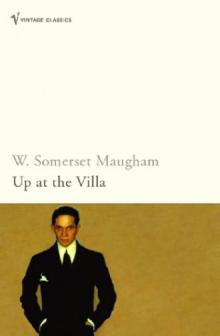 Up at the Villa
Up at the Villa The Razor's Edge
The Razor's Edge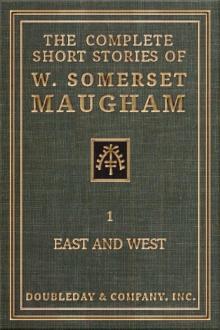 The Complete Short Stories of W. Somerset Maugham: East and West (Vol. 1 of 2))
The Complete Short Stories of W. Somerset Maugham: East and West (Vol. 1 of 2))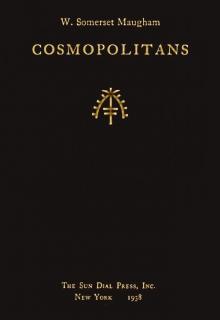 Cosmopolitans
Cosmopolitans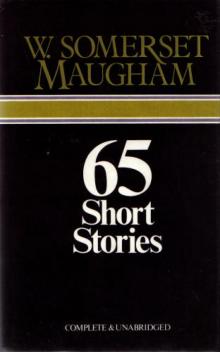 65 Short Stories
65 Short Stories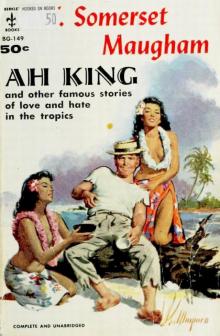 Ah King (Works of W. Somerset Maugham)
Ah King (Works of W. Somerset Maugham) Collected Short Stories: Volume 1
Collected Short Stories: Volume 1 Collected Short Stories Volume 2
Collected Short Stories Volume 2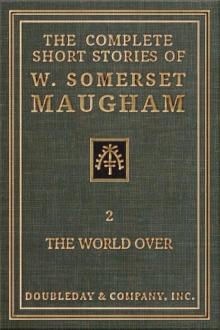 The Complete Short Stories of W. Somerset Maugham - II - The World Over
The Complete Short Stories of W. Somerset Maugham - II - The World Over Collected Short Stories Volume 4
Collected Short Stories Volume 4 Theatre
Theatre Short Stories
Short Stories Then and Now
Then and Now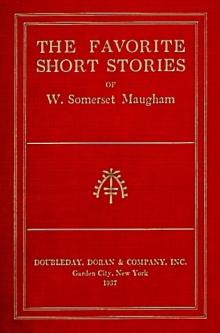 The Favorite Short Stories of W. Somerset Maugham
The Favorite Short Stories of W. Somerset Maugham Of Human Bondage
Of Human Bondage The Magician
The Magician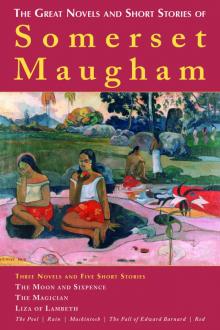 The Great Exotic Novels and Short Stories of Somerset Maugham
The Great Exotic Novels and Short Stories of Somerset Maugham A Writer's Notebook
A Writer's Notebook Christmas Holiday
Christmas Holiday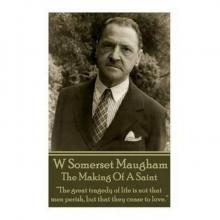 The Making of a Saint
The Making of a Saint Merry Go Round
Merry Go Round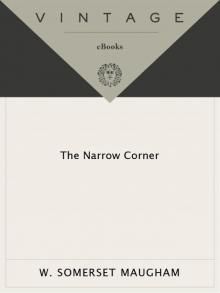 The Narrow Corner
The Narrow Corner Collected Short Stories Volume 3
Collected Short Stories Volume 3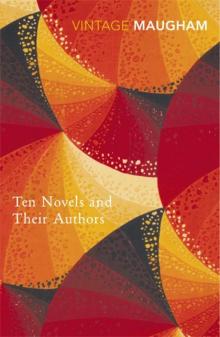 Ten Novels and Their Authors
Ten Novels and Their Authors Ashenden
Ashenden The Moon and Sixpence
The Moon and Sixpence Cakes and Ale
Cakes and Ale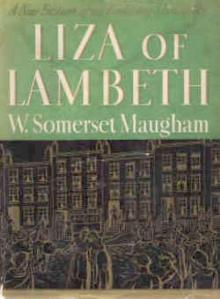 Liza of Lambeth
Liza of Lambeth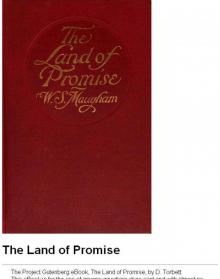 The Land of Promise: A Comedy in Four Acts (1922)
The Land of Promise: A Comedy in Four Acts (1922) A Writer's Notebook (Vintage International)
A Writer's Notebook (Vintage International)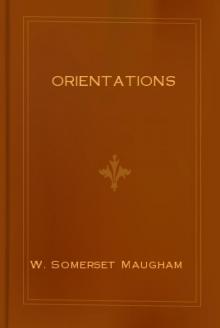 Orientations
Orientations Selected Masterpieces
Selected Masterpieces Mrs Craddock
Mrs Craddock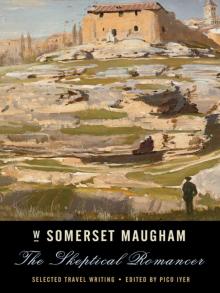 The Skeptical Romancer
The Skeptical Romancer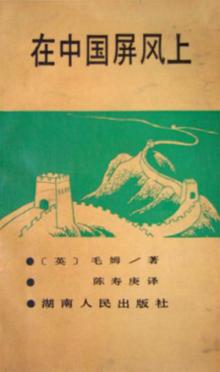 On a Chinese Screen
On a Chinese Screen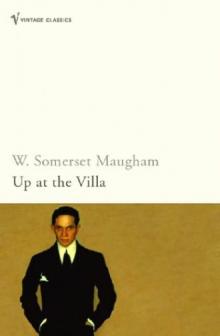 (1941) Up at the Villa
(1941) Up at the Villa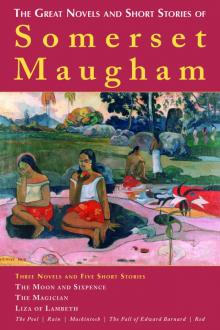 The Great Novels and Short Stories of Somerset Maugham
The Great Novels and Short Stories of Somerset Maugham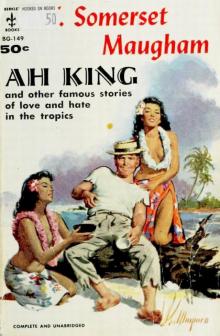 Ah King
Ah King The Explorer
The Explorer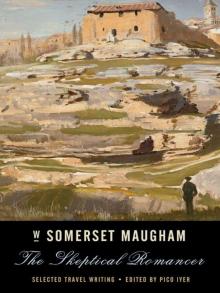 The Skeptical Romancer: Selected Travel Writing (Vintage Departures)
The Skeptical Romancer: Selected Travel Writing (Vintage Departures)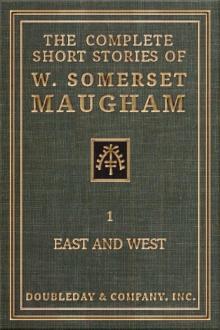 The Complete Short Stories of W. Somerset Maugham - I - East and West
The Complete Short Stories of W. Somerset Maugham - I - East and West